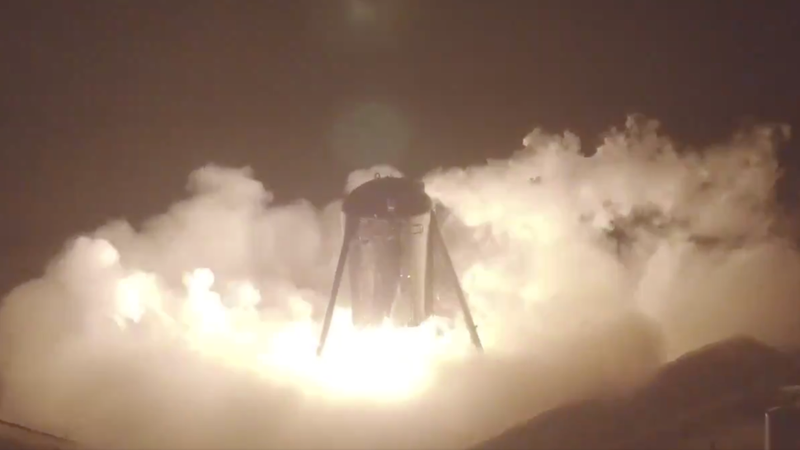
SpaceX has completed its first untethered leap of Starhopper—a prototype for its planned Starship vehicle. The brief but important test now sets the stage for more ambitious jumps.
Without any tethers to guide its way or catch its fall, Starhopper rose 20 meters (65 feet) into the air, returning safely to the ground a few seconds later, reports SpaceNews. The test happened at around 11:45 p.m. ET on July 25 at SpaceX’s Boca Chica testing grounds in South Texas. It was a small hop for Starhopper, but an important leap for SpaceX, as the company can now move forward with its ambitious Starship project.
Back in April, SpaceX conducted a series of tethered tests of the Starhopper system. Yesterday’s test came one day after an aborted untethered test, which was caused by high chamber pressure.
SpaceX CEO Elon Musk tweeted a pair of videos showing the test.
Advertisement
Footage showed the 9-meter-wide (30 feet) Starhopper slowly rising up, and then becoming completely obscured by exhaust plumes pouring out from its Raptor engine. The prototype’s inaugural free-flight lasted about 10 to 15 seconds.
Starhopper, with its stout, cylindrical shape, has been compared to a water tower, prompting this tweet from SpaceX CEO Elon Musk: “Starhopper flight successful. Water towers *can* fly haha!!”
Advertisement
Video captured by Everyday Astronaut wasn’t able to show very much of the test given the tremendous amount of smoke involved, but footage taken shortly after the test showed a sizable fire in the immediate area surrounding the prototype craft (the action starts at 4 hours and 40 minutes). Clearly, SpaceX underestimated the extent to which the flames would engulf the launchpad.
Starhopper is a prototype of the launch system that will eventually be used for SpaceX’s Starship and Super Heavy Rocket. This second stage, fully reusable rocket is intended to replace SpaceX’s Falcon9 launch vehicle, which could happen within the next two to three years.
Advertisement
This next-generation launch system will deliver satellites to Earth orbit and transport cargo and personnel to the International Space Station, the Moon, and Mars. Starship could be modified to carry 100 passengers on long-duration, interplanetary flights, but it could also be used for point-to-point transportation on Earth. A flight from New York City to Paris, for example, would take just 30 minutes on the Starship.
With this first free-flying leap now in the books, SpaceX would like to conduct more ambitious leaps. In a tweet, Elon Musk said the next jump will be a 200 meter hop in about a week or two.
Advertisement
Bagikan Berita Ini














0 Response to "SpaceX’s Starhopper Makes Its First Free-Flying Leap - Gizmodo"
Post a Comment